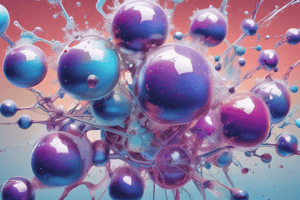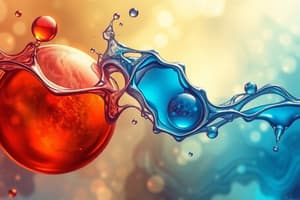Podcast
Questions and Answers
What are solutions?
What are solutions?
Homogeneous mixtures
What is a homogeneous mixture?
What is a homogeneous mixture?
It is the same throughout; you cannot see the different parts
Can a solution be a solid, liquid, and gas?
Can a solution be a solid, liquid, and gas?
True (A)
What is an example of a solid solution?
What is an example of a solid solution?
What is an example of a gas solution?
What is an example of a gas solution?
What is an example of a liquid solution?
What is an example of a liquid solution?
What are the components of a solution?
What are the components of a solution?
What is a solvent?
What is a solvent?
What is a solute?
What is a solute?
For salt water, what is the solvent and what is the solute?
For salt water, what is the solvent and what is the solute?
What are 2 ways to describe solutions?
What are 2 ways to describe solutions?
What is a QUALITATIVE description of solutions?
What is a QUALITATIVE description of solutions?
What terms are often used in qualitative descriptions?
What terms are often used in qualitative descriptions?
What does dilute mean?
What does dilute mean?
What does concentrated mean?
What does concentrated mean?
What does saturated mean?
What does saturated mean?
What does super saturated mean?
What does super saturated mean?
What equations are used for QUANTITATIVE descriptions of solutions?
What equations are used for QUANTITATIVE descriptions of solutions?
% by mass =
% by mass =
% by volume =
% by volume =
Parts per million (ppm) =
Parts per million (ppm) =
How many 0's are in 1 million?
How many 0's are in 1 million?
Molarity =
Molarity =
How many milliliters are in a liter?
How many milliliters are in a liter?
Define solubility:
Define solubility:
What does it mean if something is soluble?
What does it mean if something is soluble?
What does it mean if something is insoluble?
What does it mean if something is insoluble?
SOLIDS: As the temperature increases, the solubility will ____.
SOLIDS: As the temperature increases, the solubility will ____.
GASES: As the temperature increases, the solubility of the gas will ____.
GASES: As the temperature increases, the solubility of the gas will ____.
Does pressure affect solids?
Does pressure affect solids?
GASES: As the pressure increases, the solubility ____.
GASES: As the pressure increases, the solubility ____.
Polar and ionic compounds will dissolve in _____ _____.
Polar and ionic compounds will dissolve in _____ _____.
Polar and ionic compounds will NOT dissolve in _____ _____.
Polar and ionic compounds will NOT dissolve in _____ _____.
Non polar compounds only dissolve in _____ _____.
Non polar compounds only dissolve in _____ _____.
Non polar compounds will NOT dissolve in _____ _____.
Non polar compounds will NOT dissolve in _____ _____.
Polar solvents will NOT dissolve _____ _____.
Polar solvents will NOT dissolve _____ _____.
Non polar solvents will NOT dissolve _____ _____.
Non polar solvents will NOT dissolve _____ _____.
Flashcards are hidden until you start studying
Study Notes
Solutions Overview
- Solutions are homogeneous mixtures, meaning they have a uniform composition throughout.
- These mixtures can exist in solid, liquid, or gas forms.
Types of Solutions
- Solid Solutions: Example includes alloys, which are mixtures of metals.
- Gas Solutions: Air is a common example, primarily composed of nitrogen, oxygen, and carbon dioxide.
- Liquid Solutions: Examples include sugar water, tea, and salt water.
Components of Solutions
- Solutions consist of a solvent (the substance doing the dissolving, usually present in greater amount) and a solute (the substance being dissolved, typically present in lesser amount).
- In salt water, water acts as the solvent and salt functions as the solute.
Describing Solutions
- Solutions can be described qualitatively (without numbers) or quantitatively (with numerical values).
- Common qualitative terms include dilute, concentrated, saturated, unsaturated, and supersaturated.
Qualitative Descriptions
- Dilute: A solution with a small amount of solute compared to the solvent, often perceived as watery.
- Concentrated: Contains a large amount of solute relative to the solvent, resulting in a stronger taste.
- Saturated: Contains the maximum amount of solute that can be dissolved at a specific temperature.
- Supersaturated: More solute is dissolved than what is typically possible at that temperature, occurring under specific conditions.
Quantitative Descriptions
- Quantitative descriptions of solutions can utilize various equations like percent by mass, percent by volume, parts per million (ppm), and molarity.
- % by mass: (Mass of solute / Mass of solution) X 100
- % by volume: (Volume of solute / Volume of solution) X 100
- Parts per million: (Mass of solute / Mass of solution) X 1,000,000
- Molarity: (Moles of solute / Liters of solution)
Solubility
- Solubility refers to the amount of solute that can be dissolved in a specific amount of solvent at a given temperature.
- Soluble: A significant amount of solute can dissolve in the solvent.
- Insoluble: A significant amount of solute cannot dissolve in the solvent.
Temperature Effects on Solubility
- For solids, solubility generally increases with temperature.
- For gases, solubility decreases as temperature increases.
- Pressure typically does not affect the solubility of solids but does increase the solubility of gases.
Polarity and Solubility
- Polar and ionic compounds dissolve well in polar solvents.
- Nonpolar compounds dissolve only in nonpolar solvents, and they do not dissolve in polar solvents.
- Polar solvents do not dissolve nonpolar solutes, while nonpolar solvents do not dissolve polar or ionic solutes.
Studying That Suits You
Use AI to generate personalized quizzes and flashcards to suit your learning preferences.




